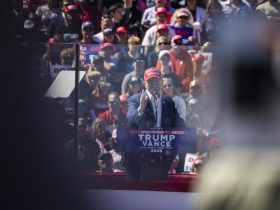An earlier version of this article misstated the year of a gun purchase by Hunter Biden that has become part of the criminal investigation. It occurred in 2018.
Prosecutors are nearing a decision on whether to charge President Biden’s son Hunter with tax- and gun-related violations, according to people familiar with the matter, the culmination of a four-year investigation that Republicans have sought to portray as evidence the Biden family is corrupt.
Biden’s attorneys met at Justice Department headquarters in downtown Washington last week to discuss the case with U.S. Attorney David Weiss of Delaware, according to the people familiar with the matter, who spoke on the condition of anonymity to discuss an ongoing criminal investigation. Typically, that sort of meeting — in which defense lawyers urge prosecutors not to seek an indictment of their client, or to seek reduced charges — comes toward the end of an investigation.
The people familiar with the matter said Weiss is nearing the end of his decision-making process, although they offered no specific timetable. They cautioned that the probe has taken longer than some officials thought it would, frustrating some law enforcement officials, and conceivably could slow down again before a decision has been reached.
Any decision could have a significant impact on President Biden, who just launched his reelection campaign, bringing national attention to a sensitive topic that aides often struggle to broach with the president. Republicans seeking to win back the White House have sought to tie Hunter Biden’s legal woes directly to his father.
Attorney General Merrick Garland has told Congress that the department’s decisions in the case would not be politicized and has said that he has granted Weiss — a holdover from the Trump administration — complete authority to run the investigation.
Garland reiterated that stance Tuesday at a news conference on an unrelated matter, telling reporters who asked about the status of the investigation: “I stand by my testimony, and I refer you to the U.S. attorney for the District of Delaware, who is in charge of this case and capable of making any decisions that he feels are appropriate.”
The attorney general was not present at the meeting with Hunter Biden’s lawyers last week, the people familiar with the matter said. A spokeswoman for Weiss declined to comment, as did a lawyer for Biden. Biden said of himself in December 2020 that he had “handled my affairs legally and appropriately.”
Although Hunter Biden kept a low profile during the 2020 presidential campaign — when he had spiraled into a battle with addiction and became a focal point of Republican attacks — he has taken on a more public and assertive role in recent months. He has appeared with his father at events including the state dinner for French President Emmanuel Macron and the Kennedy Center Honors, and was by the president’s side at nearly every stop last month during a trip to Ireland, their ancestral homeland.
“Stand up, guys,” the president said at one stop, asking his son and his sister to rise and be recognized. “I’m proud of you.”
The Washington Post reported last year that federal agents had concluded that they had enough evidence to charge Hunter Biden with tax crimes and making a false statement related to a gun purchase. But it is ultimately up to prosecutors at the Justice Department, not agents, to decide whether to file charges; prosecutors generally do so if they think the evidence is likely to lead to a conviction at trial.
The investigation into Hunter Biden began in 2018 and centered on his finances related to overseas business ties and consulting work. Over time, investigators shifted their focus to whether he failed to report all of his income and whether he lied on a form for a gun purchase by denying that he was a drug abuser.
Hunter Biden’s own memoir, “Beautiful Things,” recounts in detail his long battle with drug addiction, saying that for stretches of 2018, he smoked crack “every 15 minutes.” Of key interest to prosecutors is his purchase of a handgun in October of that year — at a time when, by his own account, he was using drugs. Biden filled out a federal form related to the purchase in which he allegedly answered “no” to the question of whether he was “an unlawful user of, or addicted to, marijuana or any depressant, stimulant, narcotic drug, or any other controlled substance.”
Prosecutions for false statements on gun-purchase forms are relatively rare, but they do happen. Federal agents refer to such cases as “lying and buying.” Historically, prosecutors have significant discretion to decide which ones are worth federal resources.
When President Donald Trump ran for reelection in 2020, facing off against Democrat Joe Biden, he made allegations of wrongdoing against Hunter Biden a centerpiece of his campaign. At the height of the campaign, Trump allies revealed that the owner of a Delaware computer repair shop had turned over to the FBI a laptop that had apparently belonged to Hunter Biden. Trump and others argued that data on the laptop showed evidence of unethical and possible illegal business deals; Joe Biden and his supporters denounced the efforts as a smear.
Last year, The Post reported that two computer security experts had reviewed nearly 129,000 emails purportedly from Hunter Biden’s computer and determined, on the basis of cryptography signatures from Google and other technology companies, that at least 22,000 could be authenticated. The Post has not been able to learn whether the laptop and its contents have been useful in the Justice Department investigation.
Republicans have long called for Garland to appoint a special counsel to handle the Hunter Biden investigation, saying that such an appointment would help keep the probe insulated from political pressure.
But Garland did not do so, saying such a step was not necessary since Weiss was a career federal prosecutor tapped by Trump to serve as a U.S. attorney. In the early days of the Biden administration, a Justice Department official said removing Weiss as U.S. attorney as he was overseeing the Hunter Biden case would probably spark significant political backlash.
Republican calls for a special counsel only intensified after Garland appointed a special counsel in November to take over Justice Department investigations into whether Trump mishandled classified material at his Mar-a-Lago residence in Florida after his presidency, and whether he or his advisers broke the law in trying to overturn the 2020 election results.
The attorney general has said he named a special counsel for the Trump probes because Trump had launched his 2024 presidential campaign and Biden — who has since declared his candidacy — was expected to seek reelection as well. Garland also appointed a different special counsel to investigate the discovery of classified documents at Biden’s Delaware home and at an office he used after his vice presidency.
Questions about the younger Biden’s foreign business ventures have long dogged his father’s political life. Trump and his GOP allies specifically cite as ethical conflicts Hunter Biden’s past work for a Ukrainian gas company while his father was vice president, as well as his China-related business affairs. In a July 2019 phone call, Trump urged Ukrainian President Volodymyr Zelensky to investigate both Joe and Hunter Biden — part of a pressure campaign that led to the first of Trump’s two impeachment trials in Congress.
In December 2020, federal agents sought to interview the younger Biden, leading him to publicly acknowledge that he was under investigation. “I take this matter very seriously but I am confident that a professional and objective review of these matters will demonstrate that I handled my affairs legally and appropriately, including with the benefit of professional tax advisors,” Hunter Biden said in a statement at that time.
His allies point out that he has paid any owed taxes, in part by using some $2 million provided by Kevin Morris, a Hollywood lawyer and novelist who befriended Hunter Biden in 2019.
The legal and political focus on Hunter Biden has been intensifying recently, with the new Republican majority in Congress launching its own investigations into his business dealings. Biden also was ordered to appear earlier this week in an Arkansas courtroom in an ongoing case between him and the mother of a 4-year-old child they had together. Hunter Biden’s lawyers, citing a “substantial material change” in his income, have been trying to lower child support payments that they say for years have been $20,000 per month.
Last month, an IRS agent who has been working on the Biden tax case asked for whistleblower protection to testify to Congress about what he asserts is political interference and improper handling of the case by the Biden administration.
Mark D. Lytle, a lawyer for the unnamed IRS criminal supervisory special agent, sent a letter to Congress saying the agent would like to give information to lawmakers that substantiates his allegations of undue influence. “Despite serious risks of retaliation, my client is offering to provide you with information necessary to exercise your constitutional oversight function and wishes to make the disclosures in a non-partisan manner to the leadership of the relevant committees on both sides of the political aisle,” Lytle wrote to top lawmakers on several House and Senate committees.
After years of trying to avoid the spotlight, Hunter Biden has started to take a more combative posture toward GOP lawmakers and other accusers. Earlier this year, a newly refashioned legal team sent cease-and-desist letters, filed countersuits and issued criminal referral letters against some of his most aggressive critics.








